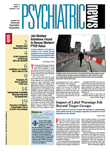The House and Senate have passed large expansions in the leading federal health care program for children, known as the State Children's Health Insurance Program (SCHIP).
The measures vary in several ways, including differing provisions related to mental health care. At press time Congressional leaders planned to begin conference committee discussions to reconcile the differences this month.
Without reauthorization, SCHIP will expire on September 30. Nonetheless, the legislation faces another serious obstacle: President Bush has threatened to veto it because of the high cost and large expansion of a government-run program.
Among the provisions that have drawn cost-related criticism from opponents of the legislation is a House-passed component mandating an end to Medicare's discriminatory payment requirements for outpatient mental health services.
The House narrowly approved SCHIP reauthorization legislation (HR 3162) over Republican opposition that was based largely on the cost of the $47-billion expansion over five years, which would be financed largely by a tobacco-tax increase and cuts for managed care companies in Medicare.
The Senate, where the legislation (S 1893) has strong bipartisan support, approved a less-aggressive $35 billion expansion. Bush had proposed a $5 billion expansion of SCHIP over five years.
The bills would insure 5 million more children, in addition to the 6 million children already covered. Under the expansion, children in the program would gain coverage for dental and mental health care.
The House bill also includes $19 billion over five years to prevent scheduled cuts to physician reimbursements under Medicare. The Senate bill does not address this issue, thus it will be up to a joint conference committee to resolve the difference.
Opponents of the House bill—mainly Republicans—criticized it as the first step toward nationalized health care and said it would reduce access to Medicare and imperil seniors. The Medicare criticism was based on a provision that would reduce insurance reimbursements under Medicare Advantage plans to the level provided under standard Medicare.
Among several mental health gains in the bill was inclusion of APA's long-sought equalization of reimbursements for outpatient mental health services with those for other medical illnesses. The 50 percent coinsurance that Medicare beneficiaries have had to pay for outpatient mental health services would drop to the 20 percent coinsurance charged for all other Part B services beginning in 2008.
“By any measure, the repeal of the 50 percent coinsurance would be a huge win for patients and for APA members, a testament to the emphasis on 'pro-patient' priorities of the Board of Trustees and vindication for 20 years for relentless lobbying by staff in that time period,” said Nicholas Meyers, director of APA's Department of Government Relations.
The Medicare copayment change would affect a significant number of nonelderly Medicare beneficiaries who have a disability and qualify through the Social Security Disability Insurance (SSDI) program. As many as 40 percent of SSDI beneficiaries have a mental disorder and must pay the higher cost for outpatient mental health services, according to a 1999 report by the Consortium for Citizens With Disabilities Housing Task Force.
The House-passed version, known as the Children's Health and Medicare Protection (CHAMP) Act, includes legislation APA helped develop to cover benzodiazepines under Medicare Part D and to establish new protections for access to critical psychiatric medications. The measure would lift the benzodiazepine exclusion in 2013, due to cost concerns; however, APA is lobbying to move that date closer.
The CHAMP Act also includes a temporary 5 percent increase in Medicare payments for psychotherapy services. The increase aims to offset previous payment reductions that disproportionately affected psychotherapy due to the way federal officials assign value to different medical services.
The Senate bill does not include any major Medicare provisions—such as parity—but it does provide mental health parity benefits for children enrolled in SCHIP plans. The parity provisions would prohibit discriminatory limits on mental health care in SCHIP plans by mandating that the same financial requirements and treatment limitations that apply to mental health or substance abuse services apply to other medical services.
House and Senate supporters of the measures face a challenge to produce legislation that can be approved in both chambers and withstand a presidential veto.
Negotiators must decide whether to keep the Medicare provisions and SCHIP expansion linked. APA and the AMA have lobbied for the physician-payment change, and a majority of Congress seems to agree that the cut must be averted. However, the expensive plan to reverse the physician payment cuts—estimated at $101 billion over 10 years, according to Congressional Budget Office—will require either steep cuts in other areas or additional taxes.
The text of the SCHIP reauthorization bills can be accessed at<http://thomas.loc.gov> by searching on the bill numbers, HR 3162 and S 1893. ▪
